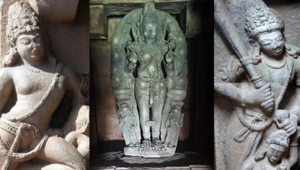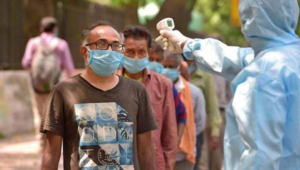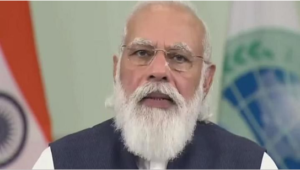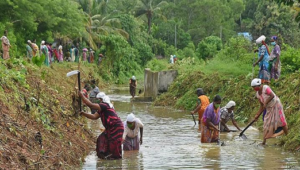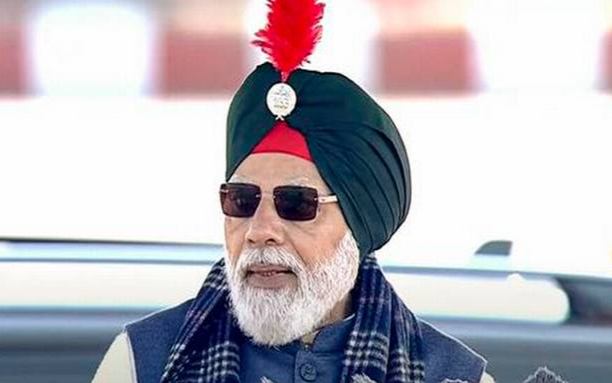
The News Editorial Analysis 29th Jan 2022
SC quashes a year’s suspension of 12 Maharashtra BJP MLAs
‘Illegal to suspend beyond a session; governments can manipulate numbers’The Supreme Court on Friday revoked the one-year suspension of 12 MLAs from the Maharashtra Assembly, calling it an “irrational” act that would impact the democratic set-up, leave constituencies unrepresented and help governments on a “thin majority” manipulate numbers.The BJP legislators were suspended for a year for “grossly disorderly conduct” in the House during the monsoon session in 2021.A Bench of Justices A.M. Khanwilkar and C.T. Ravikumar quashed the resolution of July 5 last year as “unconstitutional” and traversing beyond the powers of the Assembly.The court said it was illegal to suspend a sitting legislator beyond the ongoing session.“A suspension beyond the remainder period of the ongoing session would not only be grossly irrational measure, but also violative of the basic democratic values owing to unessential deprivation of the member concerned, and more importantly, the constituency would remain unrepresented in the Assembly,” Justice Khanwilkar observed.“It would also impact the democratic set-up as a whole by permitting the thin majority government [coalition government] of the day to manipulate the numbers of the Opposition party in the House in an undemocratic manner,” he added. he court held that the such suspensions would cripple the Opposition’s ability to effectively participate in the discussion/debate in the House owing to the constant fear of its members being suspended for longer period.“There would be no purposeful or meaningful debates but one in terrorem and as per the whims of the majority. That would not be healthy for the democracy as a whole,” it observed. It explained that suspension was essentially a disciplinary measure.Justice Khanwilkar said, “Suspension for a period of one year would assume the character of punitive and punishment worse than expulsion. Suspension for long period and beyond the session has the effect of creating a de facto vacancy though not a dejure vacancy”.Suspension of members or their withdrawal was meant to protect the House from disturbances or obstruction. The power of suspension was different from the privilege to inflict punishment on a member, he stated.The law required the Speaker to adopt a “graded approach”, based on objective and rational standards to ensure that the House functioned smoothly.The Bench had orally agreed during the hearing that prolonged suspension was worse than disqualification from the House.
‘States must decide on SC/ST quota in promotions’
Bench refuses to set norm on poor representationThe Supreme Court on Friday refused to lay down the “yardstick” for determining the inadequacy of representation for granting reservation in promotions for Scheduled Caste and Scheduled Tribe candidates in government jobs. It held ‘cadre’, and not class or group or the entire service, as the unit for the purpose of collection of quantifiable data for giving promotion quotas.
The court stuck firm by the decisions of its Constitution Benches in the Jarnail Singh and M. Nagaraj cases that the question of adequate representation of SC/ST communities ought to be left to the respective States to determine.“Determination of inadequate representation of SCs and STs in services under a State is left to the discretion of the State, as it depends upon myriad factors which this Court cannot envisage… Laying down of criteria for determining the inadequacy of representation would result in curtailing the discretion given to the State governments,” a Bench of Justices L. Nageswara Rao, Sanjiv Khanna and B.R. Gavai noted.In addition, the prevailing local conditions, which may require to be factored in, might not be uniform… In the light of Jarnail Singh and Nagaraj, we cannot lay down any yardstick for determining the inadequacy of representation,” the Bench said.In respect of the unit of collection of quantifiable data, the court held that the State is “obligated to collect quantifiable data on the inadequacy of representation of Scheduled Castes and Scheduled Tribes” for reservation in promotions in public employment.The court underscored that the “collection of information on inadequacy of representation of SC/ST communities cannot be with reference to the entire service or class/group, but it should be relatable to the grade/category of posts to which the promotion is sought”.Explaining why ‘cadre’ should be the unit for the purpose of collection of quantifiable data in relation to promotional posts, the court said otherwise the entire exercise of reservation in promotions would be rendered meaningless if data pertaining to the representation of SCs and STs is done with reference to the entire service. The term ‘cadre’ means the strength of a service or part of a service sanctioned as a separate unit. It is the choice of a State to constitute cadres. The entire service cannot be considered to be a cadre for the purpose of promotion from one post to a higher post in a different grade. Promotion is made from one grade to the next higher grade, in relation to which cadres are constituted
At the Centre
India must stay in step with the changes in the Central Asian regionAs the joint statement at the end of the India-Central Asia virtual summit on Thursday noted, ties between India and the region have been historically close, with “civilisational, cultural, trade and people-to-people linkages”, but the lack of access to land routes, and the situation in Afghanistan are among the biggest challenges. Hosted by Prime Minister Narendra Modi with the Presidents of the five Central Asian Republics (CARs), it was a first, building on years of dialogue. The summit also came after the meeting of NSAs in Delhi, where they built on several common themes of concern and priority. To begin with, there is the problem of routing trade — a paltry $2 billion, spent mostly on Kazakhstan’s energy exports to India. In comparison, China’s CAR trade figures have exceeded $41 billion — they could double by 2030 — apart from the billions of dollars invested in the Belt and Road Initiative. With Pakistan denying India transit trade, New Delhi’s other option is to smoothen the route through Iran’s Chabahar port, but that will involve greater investment in rail and road routes to Iran’s northern boundaries with the CARs, something India is hesitant to do in the face of U.S. sanctions. A third option is to use the Russia-Iran International North-South Transport Corridor via Bandar Abbas port, but this is not fully operational and at least two CARs (Uzbekistan and Turkmenistan) are not members. India too, has dragged its feet over TAPI gas pipeline plans (Turkmenistan-Afghanistan-Pakistan-India), due to supply guarantees, given the tensions with Pakistan. Finally, there is Afghanistan: the tenuous link between Central Asia and South Asia, where after the Taliban takeover, there is no official government, a humanitarian crisis is building, and there are worries of terrorism and radicalism spilling over its boundaries. Each theme has been outlined in the summit joint statement as areas to work upon. They have also agreed to more structured engagement, including the setting up of joint working groups, on Afghanistan and Chabahar, and more educational and cultural opportunities.While the attempt by India to institutionalise exchanges and press the pedal on trade, investment and development partnerships with the CARs is timely, it is by no means the only country strengthening its ties here. While Russia is the most strategic player, China is now the biggest development and infrastructure partner to the countries. The CAR Presidents held a similar virtual summit with Chinese President Xi Jinping earlier. Pakistan has also increased its outreach to the CARs, signing transit trade agreements, offering trade access to the Indian Ocean at Gwadar and Karachi. India will need to move nimbly to ensure it stays in step with the changes, and to make certain the future of ties more closely resembles the deep ties of the distant past.
Gaft talk and the top court’s inexplicable silence
Left unchallenged, a former CJI’s insinuations against the judiciary could gravely erode faith in the institution’s integrityDecember 10, 2021, was a dark day in the history of the Indian judiciary, particularly the Supreme Court of India’s. In a televised interview, where the pointed question was on whether there is corruption in the Supreme Court of India, the former Chief Justice of India, Justice Ranjan Gogoi, said: “Corruption is as old as society. Corruption has become an acceptable way of life and judges don’t fall from heaven.”
It weakens confidence
Justice Gogoi’s attack was against the entire Supreme Court and scandalised the entire institution of the Supreme Court, which demands immediate redress. Wilmot, C.J. in R. vs Almon, had as early as 1765 observed: “…and whenever men’s allegiance to the law is so fundamentally shaken, it is the most fatal and most dangerous obstruction of justice and, in my opinion, calls out for a more rapid and immediate redress than any other obstruction whatsoever; not for the sake of the Judges, as private individuals, but because they are the channels by which King’s Justice is conveyed to the people.”
The Constitution Bench of the Supreme Court in Brahma Prakash Sharma vs State of U.P. (1953) said: “It would be only repeating what has been said so often by various Judges that the object of contempt proceedings is not to afford protection to Judges, personally from imputations to which they may be exposed as individuals; it is intended to be a protection to the public whose interests would be very much affected if by the act or conduct of any party, the authority of the court is lowered and the sense of confidence which people have in the administration of justice by it is weakened.”
The Supreme Court found advocate Prashant Bhushan guilty of contempt of court, in 2020, “for shaking the confidence of the public in the institution as a whole” and for creating an “impression that … Judges who have presided in the Supreme Court in the period of last six years have a particular role in the destruction of Indian democracy”. The Court found that the attending circumstance to be taken into consideration was about the “person who makes the statement”; it held that “it is not expected of a person who is a part of the system of administration of justice and who owes a duty to the said system, to make such tweets which are capable of shaking the confidence of general public,” the judgment read.A bench presided by the now former CJI, Justice Gogoi, had in fact initiated contempt proceedings against a former Supreme Court judge, Justice Markandey Katju for similar utterances (against judges in a blog), but these were dropped after his unconditional apology .So what happens when a scurrilous attack is made and the Court is scandalised by a former CJI?
A top judge and his conduct
Justice Gogoi’s conduct raises serious questions. During his tenure as CJI, as many as eight cases of a particular business group were assigned to the Benches presided by Justice Arun Mishra, former judge of the Supreme Court. These cases were all decided in favour of the said business house, giving it relief running into thousands of crores of rupees. Interestingly, in one such case, C.A. No. 11133/2011, the said business house has settled the matter with the Gujarat Urja Vikas Nigam Limited recently, according to reports, forgoing a claim of ₹ 11,000 crore but only after a five-judge Bench of the Supreme Court decided to rectify the judgment in favour of the business house under an extraordinary curative power.Sadly, other States or authorities have not come forward with similar curative petitions for the Court to act. One gets the impression that States or authorities are happy to accept even decisions against them running into crores of rupees which are made in questionable circumstances. Thus, what they could not do directly they are allowing it to be done indirectly — by their silence.
Interestingly, this case — C.A. No. 11133/2011 was taken up during the summer vacation in 2019.
Another matter of the same business group ( C.A. No. 9023/2018), which was also not an urgent vacation matter, was listed on May 21, 2019 when the following order was made: “Heard the arguments of Mr. Ranjit Kumar, learned Senior Counsel appearing for the appellant. List tomorrow, i.e. Wednesday, the 22nd May, 2019 for further arguments.”On May 22, the matter was concluded and judgment reserved with the following order: “Heard Mr. Ranjit Kumar, learned senior counsel appearing on behalf of the appellant and Mr. Tushar Mehta, learned Solicitor General appearing on behalf of the respondent. Arguments concluded. Judgment reserved.”Pertinently, on April 8, 2019, the Registrar Judicial of the Supreme Court had passed the order stating that “regular hearing matters will be taken up as per guidelines and norms approved by the Hon’ble The Chief Justice of India”, that was, CJI Gogoi. So, has he self-incriminated himself?On this issue, I had addressed a letter on August 16, 2019 to the then CJI, Justice Gogoi, and other judges of the Supreme Court pointing out the gross abuse of the judicial process, with this request: “I do hope and trust that you would look into the matter and take corrective steps as deemed appropriate to protect this institution.” Sadly, my letter though received was not even acknowledged.
A Constitution Bench of Supreme Court, to which Justice Arun Mishra was a party has held in 2018 “that the Chief Justice is the Master of the Roster; he alone has prerogative to the constitute Benches of the Court and allocate cases to the Benches so constituted”, and that, “In view of the aforesaid, any order passed which is contrary to this order be treated as ineffective in law and not binding on the Chief Justice of India.”Why would the now former CJI, Justice Gogoi, allow matters of one business group to be heard by a Bench presided by a particular judge? Why would he not take any action after his attention was drawn to the irregularities? At his book launch on December 8, 2021, the now former CJI welcomed the industrialist concerned and his family as guests.
It has happened only once in the history of the Supreme Court when a Bench presided by (now former) CJI Justice K.N. Singh had heard and decided matters pertaining to a particular business group giving it substantial relief. But then perhaps following the outcry from Members of the Bar and the then Attorney General, the (now former) CJI H.J. Kania acted swiftly and decisively to recall those orders and restore the image and the reputation of the Supreme Court, thereby sub serving the rule of law.
The Court must act
Crony capitalism is a curse on this nation. The Supreme Court itself has come down heavily on corruption in public life and has directed time and again that action be taken against bureaucrats and politicians found guilty of corruption. Corruption is indeed a bane as far as our democracy is concerned. The judiciary must be fiercely independent and free from any kind of influence. It is indeed so, generally and by and large. It has served the nation well. The former CJI, Justice Gogoi, has done great disservice to the institution that he purportedly served. So, one wonders why there is an absolute silence on the part of this great institution. Surely, actions are needed against the former CJI, Justice Gogoi, and his actions or inactions. The Court has itself held that in such a situation, it must act on its own without waiting for the Attorney General or any person to move the Court. If not done, citizens’ faith in the integrity of the institution will be seriously eroded — perhaps irreparably.Dushyant Dave is a Senior Advocate at the Supreme Court of India and a former President of the Supreme Court Bar Association
Engage in debates in the House, not in ridiculing each other: SC‘
Elected members are expected to show statesmanship and not brinkmanship’A nation aspiring to be a “world leader” should debate on the welfare of its citizens rather than make Parliament a stage to exchange jeers and launch personal attacks on one another, the Supreme Court said in a judgment on Friday.To see Members of Parliament and Legislative Assemblies ridicule each other instead of engaging in constructive debates in Houses is hardly worthy of the claim that “we are the oldest civilisation on the planet and the world’s largest democracy”.With the completion of 75 years of Independence and ambitions of becoming a world leader, elected members should at least know that they are expected to show statesmanship and not brinkmanship in the House.
“For becoming world leaders and self-dependent/reliant, quality of debates in the House ought to be of the highest order,” a three-judge Bench led by Justice A.M. Khanwilkar said in the judgment. Legislature is the first place where justice is dispensed to the common man through a democratic process, it observed.
Intransigent place
The order dealt with the year-long suspension of 12 BJP MLAs from the Maharashtra Legislative Assembly for disorderly conduct.Parliament or the State legislatures are no places to create a ruckus. “It is a place where policies and laws are propounded for governing the citizenry. It is here that the entire range of activities concerning the masses until the last mile, are discussed and their destinies are shaped,” Justice Khanwilkar, who authored the judgment, wrote. The goal of the House was to ensure the welfare and happiness of “we the people of this nation”.The court pointed out that Parliament and Assemblies were becoming more and more an intransigent place. “The philosophical tenet that one must agree to disagree is seldom seen during debates… It has become common to hear that the House could not complete its usual scheduled business and most of the time had been spent in jeering and personal attacks against each other,” it noted.The Bench, including Justices Dinesh Maheshwari and C.T. Ravikumar, said disheartened observers felt it was high time to take corrective steps.Justice Khanwilkar observed, “Aggression during the debates has no place in the setting of country governed by the Rule of Law. Even a complex issue needs to be resolved in a congenial atmosphere by observing collegiality and showing full respect and deference towards each other.”
Youth of country can boost ‘vocal for local’ campaign: PM

‘NCC cadets must ensure schools, colleges are free from drugs’
The youth of the country can play a big role in “vocal for local” and to make India self-reliant, Prime Minister Narendra Modi said on Friday.Addressing the annual PM’s National Cadet Corps (NCC) rally at the Delhi Cantonment, Mr. Modi said steps are being taken to empower the Corps and a high-level review committee has been formed.Over one lakh new NCC cadets have been added in border areas in the past two years, Mr. Modi said, calling upon more girls to join the organisation.Calling on NCC cadets to ensure that their schools and colleges are free from the menace of drugs, Mr. Modi said, “You know very well how much drug addiction ruins our young generation. Therefore, how can drugs reach the school-college where there is NCC-NSS? As a cadet, you yourself should be free from drugs, as well as make your campus free from drugs.”The Prime Minister said India’s youth has taken the nation to the top 3 in the world in terms of start-ups and unicorns created during COVID showing their strength. Over 50 unicorns came into existence during COVID, Mr. Modi stated.“It is your responsibility to ensure that the things you’ve learned in the NCC are put into action not only when you’re in your uniform, but also in society. You can form several teams in your areas, apply it in your societies and make changes at the ground level,” he said.Referring to the NCC as an elective course in academic curriculum, the PM said 90 universities across the country have chosen the NCC as an elective subject.Stating that the number of girl cadets shows that India’s ideas are changing, Mr. Modi said the nation needs their participation and service and there are immense opportunities for women in several sectors. “Now the daughters of the country are taking admission in Sainik Schools. The daughters of the country are flying fighter planes in the Air Force. It should be our effort that more girls be included in NCC,” he said.
2.34 lakh fresh cases, 857 deaths recorded
Number of fatalities higher than last week’s averageThe country recorded 2,34,139 new COVID-19 cases on Friday. The total number of infections have crossed 4.07 crore.The figures are based on the State bulletins released until 11 p.m. on Friday. However, Ladakh, Tripura, Jharkhand and Lakshadweep had not yet released data for the day.
Kerala recorded 54,537 infections on Friday, followed by Karnataka (31,198) and Tamil Nadu (26,533).On Friday, 857 new deaths were recorded in India, considerably higher than the average levels recorded in the last week. The total number of recorded fatalities since the onset of the pandemic has crossed the 4.93 lakh mark.Kerala reported the most deaths with 352 new fatalities (339 were from a backlog), followed by Maharashtra (103) and Karnataka (50).On Thursday, 15.8 lakh tests were conducted (the results for which were made available on Friday). The test positivity rate (the number of cases detected per 100 tests) was 14.8%.As of Thursday, 92.1% of the eligible population has been vaccinated with at least one dose, while 68.8% have received both doses. In the 15-17 age cohort, 60.7% of the population have received their first dose. Altogether, 93,84,62,828 first doses, 70,09,01,469 second doses, and 1,05,31,635 booster doses have been administered across India.Andhra Pradesh reported 12 deaths due to COVID-19 and 12,561 fresh cases in the 24 hours ending Friday morning.The cumulative toll and tally increased to 14,591 and 22,45,713 respectively and the number of active cases reached 1,13,300. As many as 21,17,822 patients have recovered. The government has conducted 3,23,65,775 tests till date. 1,13,300 are active cases.Visakhapatnam reported 1,211 fresh cases in the past day. Prakasam and Guntur recorded 869 and 1625 new infections respectively. Three deaths in Visakhapatnam, two deaths each in Kurnool and Nellore, one each in Chittoor, Guntur, Vizianagaram, West Godavari and Vizianagaram districts were reported.
Gujarat recorded 12,131 new cases and 30 deaths. Active cases stood at 1,07,915 out of which 297 patients were on ventilator support.In Assam, 3,677 new cases were detected out of 44,389 tests. The positivity rate stood at 8.28%, down from 9.85% on January 26. 20 new deaths were recorded. The total deaths attributed to COVID-19 since January 1, 2022, stood at 214. The recovery rate is 93.95%, up from 93.79% on January 26. Kamrup (Metro) district, mostly comprising Guwahati, recorded the highest caseload of 768.
6% of MSMEs owned by SC entrepreneurs
Maharashtra, Tamil Nadu and Rajasthan top listMaharashtra tops India’s list in the number of micro, small and medium enterprises (MSME) owned by entrepreneurs from the Scheduled Castes with as many as 96,805 enterprises.
Generally, the proportion of enterprises owned by Scheduled Caste entrepreneurs in the overall national tally of MSMEs is 6%.Tamil Nadu with 42,997 enterprises and Rajasthan with 38,517 units occupy the second and third slots, according to the data furnished by the Office of the Development Commissioner in the Union Ministry of MSME exclusively to The Hindu regarding the number of SC-owned enterprises covered under the Udyam system of registration.The fourth, fifth and sixth slots belong to Uttar Pradesh (36,913 units), Karnataka (28,803 enterprises) and Punjab (24,503 units) respectively. As on January 23, 2022, the number of SC-owned enterprises at the all-India level was 4,53,972, of which micro enterprises accounted for 4,50,835, small 3,004 and medium 133.The Udyam system of registration, which came into force on July 1, 2020, is a pre-requisite for any MSME (regardless of the social category of ownership) to avail itself of concessions or benefits from the Central and State governments and the last date for migration to Udyam has been extended up to March 31, 2022, said K.K. Sharma, General Manager, National SC/ST Hub.
Government schemes
Mr. Sharma, however, clarified that this stipulation is only in respect of MSMEs, which want to get covered under schemes of the governments including priority sector lending of banks. Otherwise, the enterprises, which had registered themselves under the previous system such as Udyog Aadhar Memorandum (UAM), can carry on their business.
A perusal of the data on registration of enterprises under the two systems — Udyam (July 1, 2020 to January 23, 2022) and UAM (September 1, 2015 to June 30, 2020) — revealed that under the latter system, Bihar, Uttar Pradesh and Madhya Pradesh were in the first, third and fourth places with 1,46,244 enterprises; 1,33,552 and 1,08,715 enterprises respectively whereas under Udyam, their numbers stood at 23,195, 36,913 and 19,875 respectively.Asked about the wide variation in the numbers of registered units with regard to the northern States, Mr. Sharma and Milind Kamble, founder chairman of the Dalit Indian Chamber of Commerce & Industry (DICCI), explained that the Udyam system of registration is more streamlined than the previous Udyog Aadhaar Memorandum.There is no room for duplication under the new system, which has a provision for integration with the GSTN (Goods and Services Tax Network).
Economic crisis tightens grip on Sri Lanka’s hinterland
Amid shortages, families are forced to ration tea and meals
As Sri Lanka’s economic crisis makes global headlines, estate worker B. Sundararajan is watching it manifest in his teacup.In recent weeks, he has cut his usual, two cups of tea a day to one. “Milk powder is not easily available. When it is available it is not affordable. There is no other option but to cut down our tea,” said the resident of Doloswala village in Sri Lanka’s southern Ratnapura district. Besides the irony of a tea plantation worker, producing the famed ‘Ceylon tea’, rationing his own tea intake, Mr. Sundararajan’s reality lays bare the severity of Sri Lanka’s economic meltdown.
Rising inflation
The country’s fast-depleting foreign reserves — $3.1 billion at the end of 2021 — have pushed the Rajapaksa administration into a corner. The government needs dollars to import basic food items, fuel, and medicines, which have frequently been in shortage in recent months. As has milk powder, which Sri Lanka mostly imports and widely consumes in place of fresh milk.Consumers are struggling to afford essentials such as rice, pulses, vegetables, fish, and meat whose prices are soaring, amid import restrictions imposed to save foreign exchange. Consumer price inflation hit 14% last week. Finding LPG cylinders, in short supply, remains a challenge.And if the consumer is a daily-wage worker like Mr. Sundararajan, where his hard-won LKR 1,000 (₹366) wage is tied to tedious production targets, forgoing a cup of tea or even a meal, is the only option.The story of Sri Lanka’s economic crisis came to the fore amid the pandemic, which dealt a severe blow to the country’s crucial, foreign exchange earning sectors. Colombo has foreign debt obligations totalling nearly $7 billion this year, and Sri Lanka is “trying all options’” to avoid a default, Finance Minister Basil Rajapaksa recently told the Financial Times.India and China have extended emergency assistance by way of loans and currency swaps, but Sri Lanka is still on the edge. The national polity, policy makers and think tanks are debating if the country should opt for an IMF bailout. Some analysts are even arguing that Sri Lanka must prepare to default, and subsequently restructure its debt, although the government is determined to keep the country’s unblemished record in foreign debt servicing.Meanwhile, Sri Lanka’s plantation workers, like the nearly 900 employed in tea and rubber estates in Doloswala village, did not have to wait until the pandemic to know deprivation.“Over the last few years, the 1,000 rupee-wage struggle of our workers was in focus. They won the wage, but there are 1,000 other problems facing the community for decades,” said Anthony Masilamani, who works at the local administrative authority.“Our people are still living in crammed line room housing, no matter how big their families are. Our schools don’t have mathematics and science teachers for higher classes. We don’t have enough toilets. This is our reality,” he said, pointing out that the country’s recent economic downturn aggravated the workers’ misery, and didn’t create it.
U.S., EU to cooperate on energy security
The U.S. and European Union said on Friday they are working together to source alternative supplies of natural gas to protect the EU in case key energy supplier Russia retaliates against sanctions.They are “working jointly towards continued, sufficient, and timely supply of natural gas to the EU from diverse sources across the globe to avoid supply shocks, including those that could result from a further Russian invasion of Ukraine,” said a statement from President Joe Biden and EU chief Ursula von der Leyen.Russia supplies about 40% of the natural gas used in Europe, where prices are already rocketing and winter is far from over.
With U.S. and NATO allies threatening to impose crippling sanctions on Russia, if it attacks Ukraine, there are fears that Moscow could use its energy dominance as leverage.The White House is leading a search for back-up supplies. U.S. officials say that some exports previously destined for Asia from the Middle East have already been re-sold and diverted to Europe.
Honduras gets its first woman President
Leftist Xiomara Castro was sworn in on Thursday as the first woman President of Honduras, vowing to reform the crime-and poverty-stricken nation into a “socialist and democratic state.”Ms. Castro, 62, took the oath at a massive ceremony attended by international dignitaries after an embarrassing week of fighting within her party that challenged her authority.In her address at the Tegucigalpa National Stadium, Ms. Castro denounced “social and economic tragedy confronting Honduras” and vowed to improve education, healthcare, security and employment.






